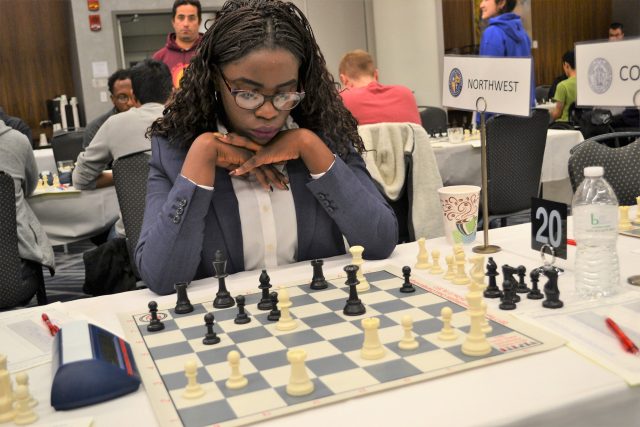Rochelle Ballantyne leapt into the chess community’s collective consciousness with the 2012 release of Brooklyn Castle, a documentary that chronicled the triumphs and struggles of the I.S. 318 chess team in New York. The interwoven personal stories of the team’s young chess stars infused the documentary with heart and grit; Rochelle took a particularly impressive turn as a rising black female chess player grappling with the pressure of expectations—especially her own.
By her senior year in high school, Rochelle had landed a full-ride scholarship to Stanford University, where she graduated in 2017. She has since moved on to an exciting new chapter of her life, which includes taking a gap year to work for San Francisco law firm Kobre and Kim before tackling her next goal of enrolling in law school.
We caught up with her recently to ask about life since Brooklyn Castle.

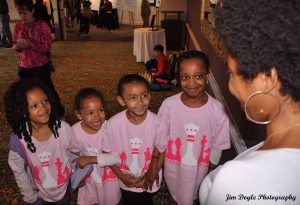
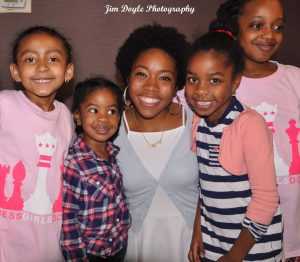 Rochelle with the Chess Girls DC
You had a flurry of publicity during this period (I was reporting from the High School Nationals in 2010, and I remember how the documentary team constantly followed you around at the All-Girls Nationals, where you won the U-18 championship). How did you feel about so much attention?
For a long time, I really didn’t understand why I was special, why my story resonated so deeply. I’m good at chess, not great. My story of being a black girl from the ‘hood, the oldest of four, being raised by a single mom trying her damnedest to support us isn’t a unique story. It’s the combination of these things that made me an anomaly. Coming to this conclusion was weird, in part because I felt I was only special because I was a black chess player—nobody would care about my achievements if I were white. It made me feel like the bar was set lower for me; because of my race, everything I accomplished was exacerbated. The effects of systemic racism, I suppose. However, I am way too hard on myself and so, to toot my own horn a bit, I have accomplished some incredible things and again, I am immensely grateful for the opportunity to inspire others who have a similar background—or even those who don’t—because the overarching moral is hard work pays off.
It was also weird because I always did what I had to do to make sure I got into college, to make sure I could help my mom with the bills, and to support my siblings. My struggles were/are real life; they’re more than a story. Chess is more than just a game to me.
Rochelle with the Chess Girls DC
You had a flurry of publicity during this period (I was reporting from the High School Nationals in 2010, and I remember how the documentary team constantly followed you around at the All-Girls Nationals, where you won the U-18 championship). How did you feel about so much attention?
For a long time, I really didn’t understand why I was special, why my story resonated so deeply. I’m good at chess, not great. My story of being a black girl from the ‘hood, the oldest of four, being raised by a single mom trying her damnedest to support us isn’t a unique story. It’s the combination of these things that made me an anomaly. Coming to this conclusion was weird, in part because I felt I was only special because I was a black chess player—nobody would care about my achievements if I were white. It made me feel like the bar was set lower for me; because of my race, everything I accomplished was exacerbated. The effects of systemic racism, I suppose. However, I am way too hard on myself and so, to toot my own horn a bit, I have accomplished some incredible things and again, I am immensely grateful for the opportunity to inspire others who have a similar background—or even those who don’t—because the overarching moral is hard work pays off.
It was also weird because I always did what I had to do to make sure I got into college, to make sure I could help my mom with the bills, and to support my siblings. My struggles were/are real life; they’re more than a story. Chess is more than just a game to me.
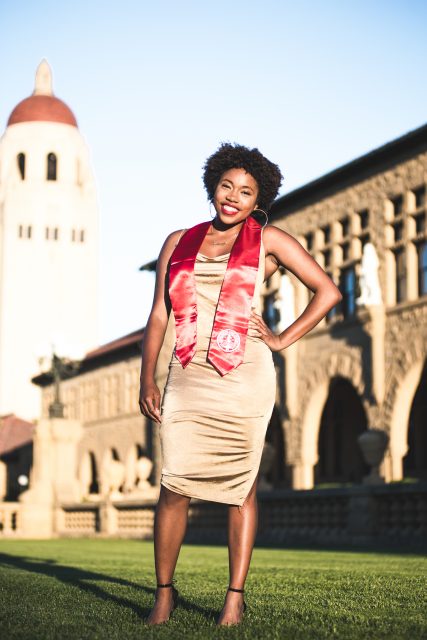 Photo Ryan Jae
Photo Ryan Jae
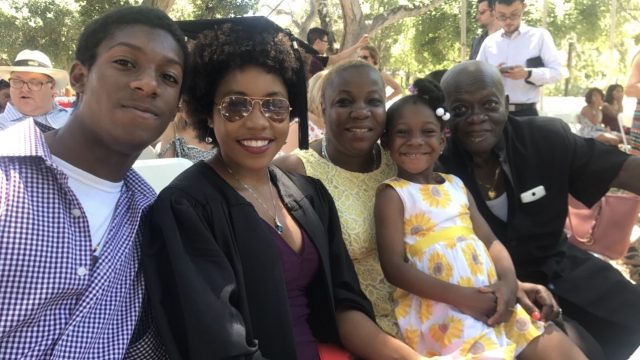 What would you like to accomplish in the next five years?
Unclear—definitely law school, get my master’s in education (thanks for showing me the light, Katie [Dellamaggiore, director of Brooklyn Castle]), and begin dismantling/reforming the criminal justice system—although that might take me longer than five years. I want to help people and help make the world a better place; it’s all I’ve ever wanted.
Did you have the opportunity to play chess at Stanford?
Chess definitely took a back seat while I navigated the dynamics of college life. I played in the world chess championships in Dubai my freshman year because of incredible donors who believed in me, and I was able to play in other tournaments intermittently and afford coaching because of the support of Soledad O’Brien, Brad Raymond, and their foundation, the Starfish Foundation [ed. note: since renamed the PowHERful Foundation].
Where is chess fitting into your life these days? Do you have plans to play anytime soon? And are you still hoping to become the first African-American female master?
Those are good questions and still questions I’m trying to unpack. I would love to be the first, but I don’t know if I deserve it. I want to say chess is probably somewhere in there because I’m not a quitter and I’ll never fully stop playing but, yeah, unclear. Unless my mom is reading this, then chess is for sure a priority.
What would you like to accomplish in the next five years?
Unclear—definitely law school, get my master’s in education (thanks for showing me the light, Katie [Dellamaggiore, director of Brooklyn Castle]), and begin dismantling/reforming the criminal justice system—although that might take me longer than five years. I want to help people and help make the world a better place; it’s all I’ve ever wanted.
Did you have the opportunity to play chess at Stanford?
Chess definitely took a back seat while I navigated the dynamics of college life. I played in the world chess championships in Dubai my freshman year because of incredible donors who believed in me, and I was able to play in other tournaments intermittently and afford coaching because of the support of Soledad O’Brien, Brad Raymond, and their foundation, the Starfish Foundation [ed. note: since renamed the PowHERful Foundation].
Where is chess fitting into your life these days? Do you have plans to play anytime soon? And are you still hoping to become the first African-American female master?
Those are good questions and still questions I’m trying to unpack. I would love to be the first, but I don’t know if I deserve it. I want to say chess is probably somewhere in there because I’m not a quitter and I’ll never fully stop playing but, yeah, unclear. Unless my mom is reading this, then chess is for sure a priority.
 What advice do you have for young people, especially those who are minorities either by race and/or income, who are struggling to combine chess and academics?
Uhhh…I’m really not good at giving chess-related advice. My mom is very strict, so I could only play chess if my grades were good. You gotta want it—that’s the only way this works. When I was ten I wasn’t thinking, “Chess is going to take me places.” I was thinking, “I love this game and if doing well in school means I get to play, then I’ll do it.”
I think the better question for minorities and low income people is how to combine chess and family responsibilities; i.e., playing chess vs. getting a job. For that I would say I love chess because it is an escape—a form of therapy almost. I love to win and I love competing, but I love chess the most because for a moment it’s just me in my head focused on beating my opponent. Nothing else matters. It was my way of briefly getting away from my responsibilities at home; otherwise, it would’ve been too much. But also, there are ways to do both—I’ve done both—but again, you have to have the drive, you have to be motivated. Chess isn’t easy, carrying that pressure of helping support your family isn’t easy, but it’s doable if you care enough about both.
Basically: make chess adapt to you and your needs, whether that be to have fun or as an escape or both.
What advice do you have for young people, especially those who are minorities either by race and/or income, who are struggling to combine chess and academics?
Uhhh…I’m really not good at giving chess-related advice. My mom is very strict, so I could only play chess if my grades were good. You gotta want it—that’s the only way this works. When I was ten I wasn’t thinking, “Chess is going to take me places.” I was thinking, “I love this game and if doing well in school means I get to play, then I’ll do it.”
I think the better question for minorities and low income people is how to combine chess and family responsibilities; i.e., playing chess vs. getting a job. For that I would say I love chess because it is an escape—a form of therapy almost. I love to win and I love competing, but I love chess the most because for a moment it’s just me in my head focused on beating my opponent. Nothing else matters. It was my way of briefly getting away from my responsibilities at home; otherwise, it would’ve been too much. But also, there are ways to do both—I’ve done both—but again, you have to have the drive, you have to be motivated. Chess isn’t easy, carrying that pressure of helping support your family isn’t easy, but it’s doable if you care enough about both.
Basically: make chess adapt to you and your needs, whether that be to have fun or as an escape or both.

The Brooklyn Castle Effect
First, let’s talk about Brooklyn Castle. Did it change your life? Do you have any thoughts or stories about the experience? There is something immensely powerful about bringing one’s story to life. It is even more powerful to have that story resonate with others. That is how Brooklyn Castle changed my life. One of my first jobs working at a law firm was because the partner at the firm heard my story and knew how passionate I was about the law. I didn’t think Brooklyn Castle would have the impact it did: it does more than just tell our stories; it tells the larger tale of how flawed our education system is and the dangerous effects of budget cuts on the public school system. A funny story regarding Brooklyn Castle is remembering all those times in junior high when I had to censor myself or remind my friends that I had a mic on so they wouldn’t say anything incriminating. Aside from being able to tell that message through my own story, I am incredibly humbled and honored to be able to inspire young people of color from inner city neighborhoods to show them the various ways chess can change their life. One of the best moments was playing in a tournament about two years ago and randomly bumping into Robin, who works with Chess Girls DC [ed. note: Robin Floyd-Ramson is the founder and director of Chess Girls DC]. She told me about her team and I was able to meet four little girls out of a 37 all-black girls’ chess team!! I wish I could accurately explain how much that meant to me. Representation is so important. Chess is isolating enough, but to have people who look like you [who are] supporting you along the way is incredible.
 Rochelle with the Chess Girls DC
Rochelle with the Chess Girls DCStanford and Beyond
You recently graduated from Stanford University (congratulations, by the way). Can you tell us about your college experience? Yes, I graduated from Stanford in June [2017] with a Bachelors of Arts in Political Science and a Bachelors of Arts with Honors in African and African-American Studies. I think for me the best way to describe college was that it was a kind of awakening. I learned so much about who I am, who I want to be, at Stanford. I was surrounded by incredibly talented people who challenged me every day (in both a good and bad way). I was able to dedicate my studies and eventually my honors thesis to how policies negatively impact communities of color, something I grow increasingly passionate about. On the other hand, I did way too much at Stanford. I led a bunch of clubs, worked at least two jobs every year, and neglected self-care. While at Stanford, you confronted a traumatic experience from the past that you’d repressed for many years. How did that affect your studies? My last years at Stanford became about dealing with my [diagnosed] mental illness. It was hard, incredibly debilitating, and it sucked. Yet I survived, I inevitably thrived, and I “found” myself at Stanford. I’ve come a long way and I’m incredibly proud of the woman I’ve become as a result of my four years on the farm. I am really glad to be done, though. Photo Ryan Jae
Photo Ryan Jae What would you like to accomplish in the next five years?
Unclear—definitely law school, get my master’s in education (thanks for showing me the light, Katie [Dellamaggiore, director of Brooklyn Castle]), and begin dismantling/reforming the criminal justice system—although that might take me longer than five years. I want to help people and help make the world a better place; it’s all I’ve ever wanted.
Did you have the opportunity to play chess at Stanford?
Chess definitely took a back seat while I navigated the dynamics of college life. I played in the world chess championships in Dubai my freshman year because of incredible donors who believed in me, and I was able to play in other tournaments intermittently and afford coaching because of the support of Soledad O’Brien, Brad Raymond, and their foundation, the Starfish Foundation [ed. note: since renamed the PowHERful Foundation].
Where is chess fitting into your life these days? Do you have plans to play anytime soon? And are you still hoping to become the first African-American female master?
Those are good questions and still questions I’m trying to unpack. I would love to be the first, but I don’t know if I deserve it. I want to say chess is probably somewhere in there because I’m not a quitter and I’ll never fully stop playing but, yeah, unclear. Unless my mom is reading this, then chess is for sure a priority.
What would you like to accomplish in the next five years?
Unclear—definitely law school, get my master’s in education (thanks for showing me the light, Katie [Dellamaggiore, director of Brooklyn Castle]), and begin dismantling/reforming the criminal justice system—although that might take me longer than five years. I want to help people and help make the world a better place; it’s all I’ve ever wanted.
Did you have the opportunity to play chess at Stanford?
Chess definitely took a back seat while I navigated the dynamics of college life. I played in the world chess championships in Dubai my freshman year because of incredible donors who believed in me, and I was able to play in other tournaments intermittently and afford coaching because of the support of Soledad O’Brien, Brad Raymond, and their foundation, the Starfish Foundation [ed. note: since renamed the PowHERful Foundation].
Where is chess fitting into your life these days? Do you have plans to play anytime soon? And are you still hoping to become the first African-American female master?
Those are good questions and still questions I’m trying to unpack. I would love to be the first, but I don’t know if I deserve it. I want to say chess is probably somewhere in there because I’m not a quitter and I’ll never fully stop playing but, yeah, unclear. Unless my mom is reading this, then chess is for sure a priority.
Gender and Race Constructs
This is Black History Month, and when I first contacted you, you wanted to make sure that the larger issues of race were adequately addressed—for example, what barriers are preventing more people of color from becoming involved in chess. Can you talk about some of the challenges you face/faced as 1) a female player, 2) an African-American player, and 3) as both? I think one of the most frustrating (frustrating might be the wrong word) things I realized as an African-American female chess player was the feeling that I didn’t belong. I was always the odd person out. Always asked whether or not I was lost. Chess is supposed to be a battle of intellect and my intellect always seemed to be diminished or erased because I am black and because I am a woman. Luckily, when I started playing chess I was too young to really process race and gender as a construct. I knew I was different but I didn’t care because I wanted to win. And that drive continues to carry me. What advice do you have for young people, especially those who are minorities either by race and/or income, who are struggling to combine chess and academics?
Uhhh…I’m really not good at giving chess-related advice. My mom is very strict, so I could only play chess if my grades were good. You gotta want it—that’s the only way this works. When I was ten I wasn’t thinking, “Chess is going to take me places.” I was thinking, “I love this game and if doing well in school means I get to play, then I’ll do it.”
I think the better question for minorities and low income people is how to combine chess and family responsibilities; i.e., playing chess vs. getting a job. For that I would say I love chess because it is an escape—a form of therapy almost. I love to win and I love competing, but I love chess the most because for a moment it’s just me in my head focused on beating my opponent. Nothing else matters. It was my way of briefly getting away from my responsibilities at home; otherwise, it would’ve been too much. But also, there are ways to do both—I’ve done both—but again, you have to have the drive, you have to be motivated. Chess isn’t easy, carrying that pressure of helping support your family isn’t easy, but it’s doable if you care enough about both.
Basically: make chess adapt to you and your needs, whether that be to have fun or as an escape or both.
What advice do you have for young people, especially those who are minorities either by race and/or income, who are struggling to combine chess and academics?
Uhhh…I’m really not good at giving chess-related advice. My mom is very strict, so I could only play chess if my grades were good. You gotta want it—that’s the only way this works. When I was ten I wasn’t thinking, “Chess is going to take me places.” I was thinking, “I love this game and if doing well in school means I get to play, then I’ll do it.”
I think the better question for minorities and low income people is how to combine chess and family responsibilities; i.e., playing chess vs. getting a job. For that I would say I love chess because it is an escape—a form of therapy almost. I love to win and I love competing, but I love chess the most because for a moment it’s just me in my head focused on beating my opponent. Nothing else matters. It was my way of briefly getting away from my responsibilities at home; otherwise, it would’ve been too much. But also, there are ways to do both—I’ve done both—but again, you have to have the drive, you have to be motivated. Chess isn’t easy, carrying that pressure of helping support your family isn’t easy, but it’s doable if you care enough about both.
Basically: make chess adapt to you and your needs, whether that be to have fun or as an escape or both.
Mentors, Friends, and Supporters
Who are your mentors and how did they influence you? Who inspires you? Who are your chess heroes? I highly doubt I have any chess heroes. I’m more interested in chess applications and so those folks get grouped into the first question of mentors/inspirers(?)— is that a word? For sure Maurice Ashley, because he’s the first black grandmaster and he inspires me to continue with my goals. Unbeknownst to him, he has actually convinced me to not quit chess altogether when I wasn’t progressing. Mrs. Elizabeth Spiegel/Vicary, Mr. John Galvin, Mr. Ian West for continuously pushing, supporting me, and believing in me. My grandma, who probably had no idea the competitive monster she was creating when she first introduced me to the game. I cannot thank my coaches enough for their commitment to me and my goals. Soledad O’Brien for not only her financial support but her emotional support as well. She goes above and beyond for all her mentees and I’m truly grateful for all that she does and will continue to do to further support low-income women. Sarah Pitari and Danielle Hayman, whom I met in high school at Chess-in-the-Schools and whom I credit to getting me into Stanford with a full ride. They saw that I was more than a chess player—I was a kid with way too much pressure on her shoulders. They changed my life and I owe them everything. Well…not everything, because the last person who inspires me is Momma B, who I really owe everything to because she gave me life—thanks, mom. Almost everything I do, I do to help take some of the pressure off her shoulder. It is the least I could do; I am her first born and I take that responsibility very seriously.Final Questions
Did you watch Queen of Katwe? What did you think about it? Of course I watched Queen of Katwe. The similarities between our lives is scary; I could relate to a majority of the scenes in the movie. Additionally, the movie really made me appreciate my mom more who, like Phiona’s mom, works hard to make sure we have a roof over our head and food to eat. Even though my mom couldn’t come with me to tournaments, she made me call her before every round of any one of my big tournaments and prayed for me. Like Phiona’s mom, my mom, too, initially had a hard time trusting any of my coaches; my mom is truly a force to be reckoned with and does not play when it comes to her kids. I guess by extension Phiona’s mom inspires me as well—I don’t know you, but if you’re anything like my mom, and it appears you are, I want to be half the woman you (and my mom) are. Where’s the best place to keep up with you and your activities? From word of mouth or a major news network. I really get uncomfortable when random people friend request me or follow me on Instagram. Any last words? Stay woke—however that works for you. And happy Black History Month, everyone.Categories
Archives
- January 2026 (8)
- December 2025 (27)
- November 2025 (29)
- October 2025 (39)
- September 2025 (27)
- August 2025 (29)
- July 2025 (43)
- June 2025 (25)
- May 2025 (24)
- April 2025 (29)
- March 2025 (29)
- February 2025 (20)
- January 2025 (24)
- December 2024 (34)
- November 2024 (18)
- October 2024 (35)
- September 2024 (23)
- August 2024 (27)
- July 2024 (44)
- June 2024 (27)
- May 2024 (31)
- April 2024 (51)
- March 2024 (34)
- February 2024 (25)
- January 2024 (26)
- December 2023 (29)
- November 2023 (26)
- October 2023 (37)
- September 2023 (27)
- August 2023 (37)
- July 2023 (47)
- June 2023 (33)
- May 2023 (37)
- April 2023 (45)
- March 2023 (37)
- February 2023 (28)
- January 2023 (31)
- December 2022 (23)
- November 2022 (32)
- October 2022 (31)
- September 2022 (19)
- August 2022 (39)
- July 2022 (32)
- June 2022 (35)
- May 2022 (21)
- April 2022 (31)
- March 2022 (33)
- February 2022 (21)
- January 2022 (27)
- December 2021 (36)
- November 2021 (34)
- October 2021 (25)
- September 2021 (25)
- August 2021 (41)
- July 2021 (36)
- June 2021 (29)
- May 2021 (29)
- April 2021 (31)
- March 2021 (33)
- February 2021 (28)
- January 2021 (29)
- December 2020 (38)
- November 2020 (40)
- October 2020 (41)
- September 2020 (35)
- August 2020 (38)
- July 2020 (36)
- June 2020 (46)
- May 2020 (42)
- April 2020 (37)
- March 2020 (60)
- February 2020 (38)
- January 2020 (45)
- December 2019 (34)
- November 2019 (35)
- October 2019 (42)
- September 2019 (45)
- August 2019 (56)
- July 2019 (44)
- June 2019 (35)
- May 2019 (40)
- April 2019 (48)
- March 2019 (61)
- February 2019 (39)
- January 2019 (30)
- December 2018 (29)
- November 2018 (51)
- October 2018 (45)
- September 2018 (29)
- August 2018 (49)
- July 2018 (35)
- June 2018 (31)
- May 2018 (39)
- April 2018 (31)
- March 2018 (26)
- February 2018 (33)
- January 2018 (30)
- December 2017 (26)
- November 2017 (24)
- October 2017 (30)
- September 2017 (30)
- August 2017 (31)
- July 2017 (28)
- June 2017 (32)
- May 2017 (26)
- April 2017 (37)
- March 2017 (28)
- February 2017 (30)
- January 2017 (27)
- December 2016 (29)
- November 2016 (24)
- October 2016 (32)
- September 2016 (31)
- August 2016 (27)
- July 2016 (24)
- June 2016 (26)
- May 2016 (19)
- April 2016 (30)
- March 2016 (36)
- February 2016 (28)
- January 2016 (32)
- December 2015 (26)
- November 2015 (23)
- October 2015 (16)
- September 2015 (28)
- August 2015 (28)
- July 2015 (6)
- June 2015 (1)
- May 2015 (2)
- April 2015 (1)
- February 2015 (3)
- January 2015 (1)
- December 2014 (1)
- July 2010 (1)
- October 1991 (1)
- August 1989 (1)
- January 1988 (1)
- December 1983 (1)


